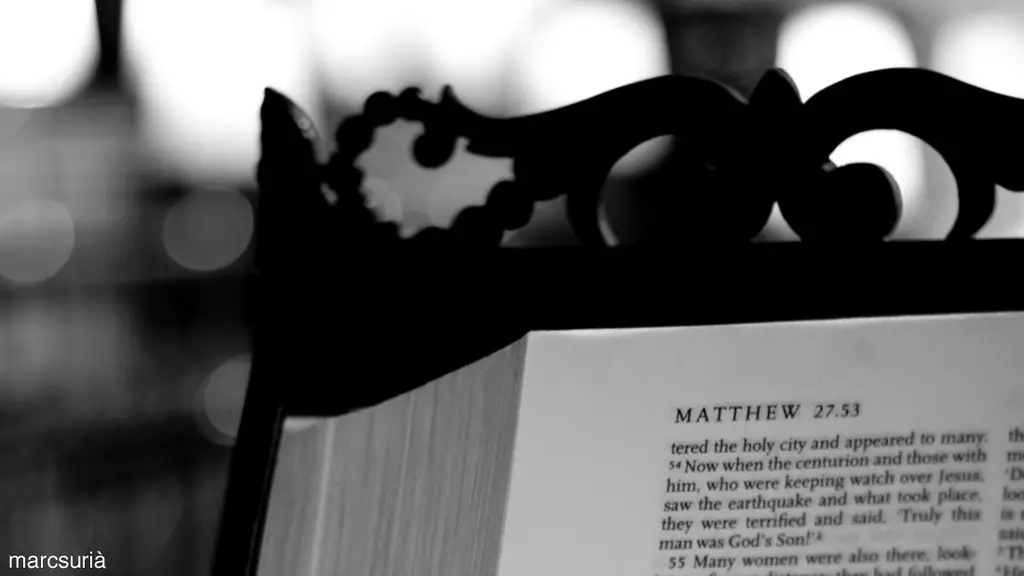Josiah, one of the most well-known Old Testament kings, has been a source of fascination and religious devotion in Christianity for many centuries. His story is recorded in 2 Kings 22-23 and 2 Chronicles 34-35. It is believed that he was a member of the house of David and was born around 641 BCE. He reigned over Judah from approximately 629-609 BCE, and is praised for his religious reforms.
During his reign, Josiah sought to restore the Temple of God and the Mosaic Law to its original form. He took steps to remove foreign gods from the kingdom, to rededicate the Temple, to halt the practice of sacrificing children to the idol Molech, and to restore the Passover festival. His reforms and his dedication to the worship of the Jewish God are widely celebrated.
Josiah is one of the most significant kings in the Bible, and is often cited as an example of a righteous ruler. His reform was a key turning point for the kingdom of Judah and is seen as a cultural and spiritual milestone. Josiah is widely celebrated as a model of faithfulness and obedience to God, and is a widely respected figure in Christianity.
The influence of the reforms and succession of Josiah marked a shift in the religious landscape of Judah. Many scholars believe that the reforms helped to ensure that the monotheistic, (Judeo-Christian) form of religion which would eventually be embraced by Christianity, would endure in the Middle East. Scholars also agree that Josiah’s succession brought a sense of stability to a region which, at this point in history, was beset by many challenges.
The tale of Josiah is told with great reverence at Biblical and religious sites throughout the world, and his story continues to be remembered and celebrated. He is a popular figure in Jewish and Christian art and literature, and his story is a source of inspiration to many. There is also a variety of artifacts dated to the reign of Josiah, including pottery and seals which attest to his importance and impact on the kingdom.
The impact of Josiah is also felt in the realm of international relations. The reforms and succession of Josiah ushered in an era of religious and cultural cooperation between the Hebrews and their Assyrian and Babylonian neighbours. Josiah is widely seen as having unified the Israeli people and helped to bring religious and cultural harmony to a region which had been plagued by war and strife.
In conclusion, Josiah is one of the most influential figures in the Bible and his story continues to be studied and celebrated by religious scholars and devoted Christians alike. His reign is widely seen as a major turning point in Israel’s history and is remembered as a sign of faithfulness and religious reforms.
Religious Significance
Josiah’s reforms, particularly his re-dedication of the Temple and the restoration of the Mosaic Law are of great religious significance. His actions are seen as a testament to the importance of faith and obedience in the eyes of God, and his story is a powerful reminder of the importance of following the Word of God. Josiah is also seen as a symbol of righteousness and justice, and his reign is seen as a gift from God for keeping the faith and adhering to the laws.
Josiah’s reforms and dedication to the worship of the Jewish God unified the Israelites, helping them to survive and maintain their traditions in the face of external threats. His act of devotion towards the Lord is seen as a key step in the spread of monotheism and the unification of the faith.
Josiah’s reforms and succession were also a major milestone in Israel’s relations with its neighbours. He is credited with unifying the Hebrews and encouraging cooperation and mutual respect between them and the older Assyrian and Babylonian cultures.
These reforms also helped to ensure that the Jewish form of religion, which would eventually be adopted and adapted by Christianity, would remain influential and respected in the region. The story of Josiah is therefore of great religious significance and is seen as a key moment in Judaism and Christianity.
Legacy and Influence
The reforms and succession of Josiah are remembered with great reverence and admiration. He is seen as a model of faithfulness and devotion to the Lord, and his story is retold by religious leaders and teachers of faith. His reforms and unifying influence are still felt today and his story is a source of inspiration to many.
Josiah is also remembered in the realm of art and literature, and is a popular figure in Jewish and Christian texts. He is also celebrated in artifacts from this period, such as pottery and seals bearing his name. This legacy serves as a reminder of the power and importance of Josiah and his lasting impact on the kingdom of Judah.
In summary, Josiah is one of the most influential figures in the Bible and his story continues to be studied and celebrated by religious scholars and devoted Christians alike. His actions are seen as a testament to the importance of faith and obedience, and his reforms and succession are seen as a major milestone in the history of Israel.
Comparison
Comparison of Josiah when contrasted with other Old Testament kings helps to further understand the significance of his reforms and what makes him stand out. Josiah stands out due to his devotion to God and his willingness to put faith in practice, while other kings who preceded him are seen as more power-hungry and corrupt.
Josiah’s faith is highlighted when compared to the kings preceding him, particularly Manasseh, who was known for introducing idolatry and other pagan practices into the Kingdom.
Josiah challenged oppressive and pagan religious practices, working to restore the Temple of God and the Mosaic Law to their original forms. This showed a deep-rooted devotion to the Lord and dedication to religious reform, a trait which was not shared by many other kings.
Josiah was also known for his unifying impact, working to bring the kingdom of Judah and its neighbors together in harmony. He is celebrated for his wisdom, and for helping to create an atmosphere of religious and cultural cooperation, which helped foster the Judeo-Christian tradition.
In conclusion, when compared with other Old Testament kings, Josiah stands out due to his unwavering faith, dedication to reform and influence on religious and cultural unity. His story is a powerful example of what one person can do through devotion and service to the Lord, and his legacy is still felt today.
Current Practices
Today, many of the practices instated by Josiah are still celebrated in religious ceremonies and rituals. His actions are remembered as examples of faith and devotion and are seen as fulfilling a divine plan. Many churches, synagogues and religious sites throughout the world celebrate the life of Josiah through services, lectures, and festivals.
Josiah is also celebrated in contemporary art and literature, with many works drawing inspiration from his story. From religious music to films, the legacy and impact of Josiah can be felt throughout the world, and his story remains an important source of motivation and inspiration.
Religious and archaeological findings also suggest that many of the rituals and believed to have been instated by Josiah are still celebrated today, including Passover and other major Jewish rituals. In addition, artifacts from this period, such as pottery and seals found in archaeological excavations, are evidence of the lasting legacy of Josiah.
In summary, the legacy of Josiah is still felt today, through religious ceremonies, art, literature, and archaeological findings. His story continues to be remembered and celebrated and provides an important source of inspiration and motivation for many.
Conclusion
Josiah is one of the most influential figures in the Bible and his story continues to be studied and celebrated by religious scholars and devoted Christians alike. His reform was a key turning point for the kingdom of Judah and is seen as a cultural and spiritual milestone, and his legacy is still relevant in today’s world. He is praised for his religious reforms, his dedication to the worship of the Jewish God, his legacy of religious and cultural cooperation, and his lasting influence on Christianity.





